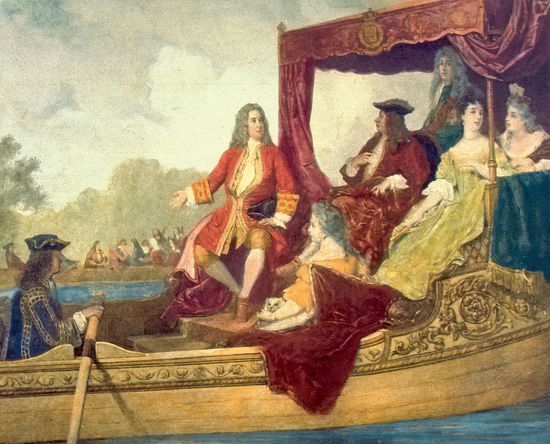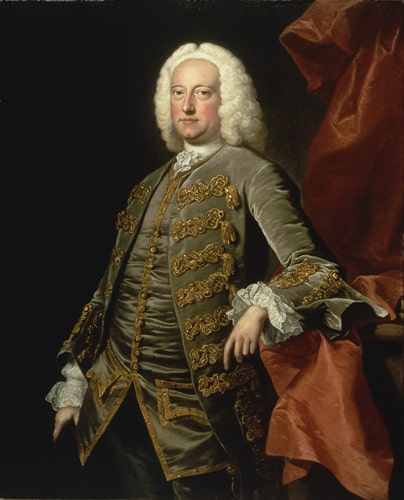Handel composed his great oratorio, Messiah, in London in the eighteenth century. It is now the most popular choral work in the English language. But what is the story behind it?
Its composer, Georg Frideric Händel, was born in 1685 in Halle in the Duchy of Magdeburg. He showed a remarkable youthful aptitude for music and, at the age of only 25, was appointed to the prestigious position of Kapellmeister to the Elector of Hanover. But, no sooner was he appointed, than he visited England, and found it so much more to his taste that he settled there, deserting his duties in Hanover. Within two years, he had been granted a stipend of £200 per annum from Queen Anne for his work as a composer. And he became an Englishman, Mr Handel. (In reply to those who questioned his Englishness, he would reply in his thick German accent, “I, sir, am more English than you. For you are English by accident, and I am English by choice.”)
But in 1714, to the dismay of many, not least Mr Handel, his former boss, Georg, the Elector of Hanover, was crowned King George I of England and moved to London. (Although Georg was fifty-second in line to the throne, the first fifty-one claimants were all Catholic, and so, of course, it was all perfectly reasonable.) Handel swiftly made the best of this tricky situation, composing the Water Music for the new king. The king, for his part, was happy to meet someone in London who spoke his language, for he spoke no English, and never learned it. And so Handel’s misdemeanour was forgotten and the two Georgs were reconciled.

Handel’s great Messiah is inevitably compared with that other great Baroque masterpiece, the Matthäuspassion of J.S. Bach. Of course, at first glance they look similar. Both are of extraordinary length. Both are scored for soli and chorus. Their composers look similar too. Both were born in Germany in the year 1685. Both developed remarkable musical gifts from a meagre musical education. Both were men of forceful temperament. And both were men of genuine evangelical faith. And yet these two monuments of Baroque music are different in many ways.
First, Messiah is an oratorio. Oratorios arose in 17th-century Italy when the church banned opera during Lent. The Italian impressarios and composers, not missing a beat, immediately invented oratorio as an acceptable form of Lenten stage entertainment. The themes of these pieces were sacred, of course, but, in essence, they were commercial theatre pieces written for a public stage and a paying audience. Handel was the one who imported this idea into England—where the same Lenten prohibitions prevailed—and wrote the first English oratorio, Esther, in 1718.
The Bach Passions, on the other hand, are church music, designed for liturgical performance during worship on the evening of Good Friday. Their origins lie not in the theatre, but in the earliest Passiontide traditions of the church. Their nearest neighbour is an event like the Oberammergau Passion Play.
There are important differences in the musical language and mood too. Bach’s Passion is a deeply inward work, of most complex harmony, a profound meditation on the love, pain, and sacrifice of Jesus, all lending itself to the Good Friday meditation. Messiah, on the other hand, is an extrovert work about the triumph of Jesus—appealing, public, bold, glorious—characterized by simpler harmony and simple rhythmic motifs.
And finally, while Bach’s Great Passion is based on the Passion narrative of a single gospel text, Messiah is based on a pot-pourri of scripture passages, arranged to tell the whole story of the coming, suffering, and triumph of Jesus the Messiah from beginning to end. These texts were selected by Charles Jennens, a Jacobite sympathizer, whose refusal to swear allegiance to the House of Hanover made him an outsider in Georgian London. Yet, his libretto is so fundamental to the existence of Messiah that it is as much Jennens’s Messiah as it is Handel’s.

Charles Jennens had already worked with Handel on oratorio texts when, in 1740, he came up with the idea of an oratorio that would preach the entire gospel. This was at a time in English religious life when evangelical believers considered the Anglican Church to be a most worldly witness to evangelical faith. And, since the emptiness of London’s churches contrasted with the fullness of its theatres, Jennens’s dream was to take the gospel message into the theatres and music halls where it would be heard by many.
It was a dream which Handel shared, and he promised Jennens that he would write his best-ever music for this libretto. But Handel was in desperate financial straits. His writing of the masterpiece in 24 days had as much to do with his need to take on other work as it had to do with flowing inspiration. Jennens was annoyed. He said that Handel had done a rush-job on his libretto. (Spare a thought for the wordsmith! The music rarely meets his hopes.) Handel spent years enduring Jennens repeated attempts to pester him into improving the music.
Messiah met with an enthusiastic reception when it was first performed in Dublin in 1742. Its first reception in London was cooler altogether. But it became popular after the Foundling Hospital performance a few years later. Soon after, Mozart took it up and reorchestrated it. And Mozart’s more lavish orchestration led in turn to massive performances of the work which, by the end of the nineteenth century, featured as many as 3,500 singers, with orchestras of 1,500.
Nowadays, we may look back on three centuries of Handel’s great Messiah with a more objective eye. It is the epitome of Baroque glorioso. It contains some of the grandest and best-known music ever written. Who does not know the Hallelujah chorus? It is performed thousands and thousands of times each year, in part and in whole, not only in English-speaking lands, but in every continent and corner of the world, sometimes translated, sometimes sung in English by those with only the least knowledge of the language. Messrs Jennens and Handel would surely be amazed at what has become of their collaboration.
Of course, there are those who say it is too long, too loose, too brash, and good only in parts. Yet, quibbles aside, it is still the rightful king of English oratorios. Haydn, Mozart, Beethoven, and Brahms loved it. And so its great song of praise to the Messiah is more than worthy of being sung here again tonight.
In accord with Handel’s intention, part of the proceeds of Holy Trinity’s annual Messiah performance go toward a charitable foundation for children, Les Projets d’Eléonore, which supports sick children and their families at St Luc Hospital, the University-Clinic of the Catholic University of Louvain. For more on Holy Trinity’s Messiah, please see the Music Ministry page.
